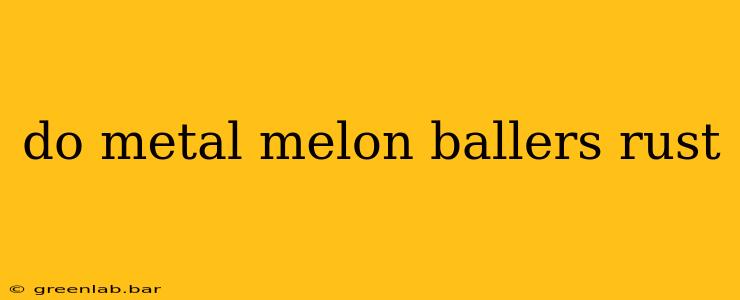Do Metal Melon Ballers Rust? A Deep Dive into Material, Maintenance, and Longevity
Many home cooks prize their melon ballers for creating perfectly sized spheres of fruit for salads, desserts, and garnishes. But a common concern, especially for those with metal ballers, is rust. So, do metal melon ballers rust? The short answer is: yes, they can, but the likelihood depends on several factors. Let's explore these factors in detail.
Understanding the Materials: The Root of the Rust Problem
Most metal melon ballers are made from stainless steel, a popular choice due to its durability and resistance to corrosion. However, not all stainless steel is created equal. The quality of the stainless steel directly impacts its resistance to rust. Lower-grade stainless steel, often found in cheaper melon ballers, contains less chromium and nickel, the elements that provide superior corrosion resistance. These lower-grade ballers are more susceptible to rusting, particularly under certain conditions.
Other metals, while less common, might also be used in melon baller construction. These materials are even more prone to rust. For example, a melon baller made from plain carbon steel will rust much more readily than one made from high-quality stainless steel.
Factors that Increase the Risk of Rust
Several factors contribute to the rusting process of metal melon ballers, regardless of the material's quality:
-
Exposure to Moisture: This is the primary culprit. Leaving your melon baller wet after washing is a recipe for rust. Water, especially if it contains minerals or salts, accelerates corrosion.
-
Lack of Proper Cleaning: Food residue left on the baller can create an acidic environment, promoting rust formation. Thoroughly cleaning and drying the baller after each use is essential.
-
Storage Conditions: Storing your melon baller in a damp or humid environment increases the risk of rust. Ensure it's stored in a dry, well-ventilated area.
-
Exposure to Salt: Salt, like moisture, is a significant contributor to corrosion. If you use your melon baller with salty fruits or vegetables, be extra diligent with cleaning and drying.
-
Material Quality: As discussed, lower-quality stainless steel or other metals are far more vulnerable to rusting compared to their high-quality counterparts.
Preventing Rust: Tips for Melon Baller Longevity
To maximize the lifespan of your metal melon baller and prevent rust, follow these simple yet effective steps:
-
Choose High-Quality Stainless Steel: Invest in a well-made melon baller from reputable brands, ideally specifying high-quality stainless steel in the product description.
-
Wash and Dry Thoroughly: Always wash your melon baller immediately after use with warm, soapy water. Dry it completely with a clean cloth or allow it to air dry before storing.
-
Store Properly: Store your melon baller in a dry place, away from moisture and humidity. A well-ventilated drawer or cupboard is ideal.
-
Avoid Abrasive Cleaners: Harsh chemicals and abrasive cleaners can damage the surface of the melon baller, making it more susceptible to rust. Stick to mild dish soap and water.
-
Regular Inspection: Periodically inspect your melon baller for any signs of rust. Addressing rust spots early can prevent further damage.
Conclusion: A Rust-Free Future for Your Melon Baller
While metal melon ballers can rust, proper care and maintenance significantly reduce the risk. By understanding the factors that contribute to rust and following the preventative measures outlined above, you can ensure your melon baller remains rust-free and serves you well for years to come. Remember, selecting a high-quality stainless steel baller is your best first step towards long-term rust prevention.

